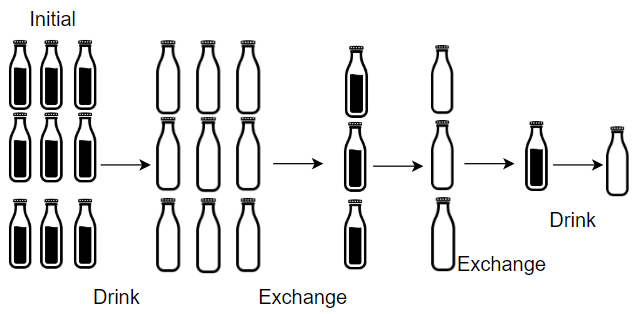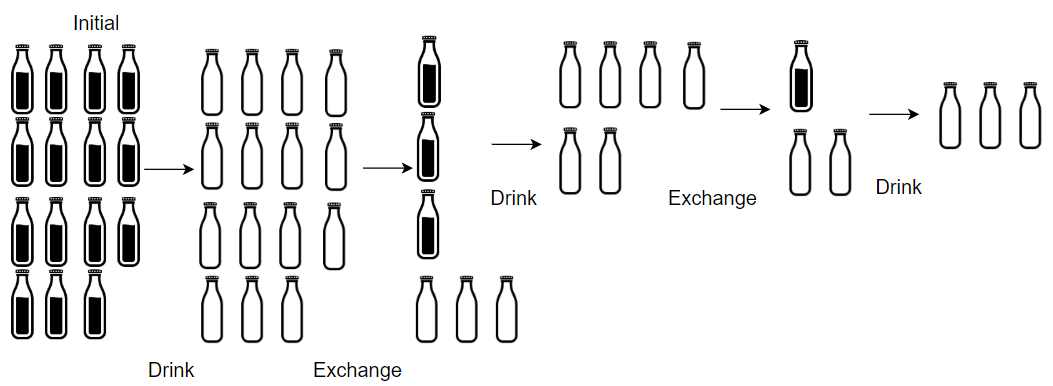Welcome to Subscribe On Youtube
1518. Water Bottles
Description
There are numBottles water bottles that are initially full of water. You can exchange numExchange empty water bottles from the market with one full water bottle.
The operation of drinking a full water bottle turns it into an empty bottle.
Given the two integers numBottles and numExchange, return the maximum number of water bottles you can drink.
Example 1:

Input: numBottles = 9, numExchange = 3 Output: 13 Explanation: You can exchange 3 empty bottles to get 1 full water bottle. Number of water bottles you can drink: 9 + 3 + 1 = 13.
Example 2:

Input: numBottles = 15, numExchange = 4 Output: 19 Explanation: You can exchange 4 empty bottles to get 1 full water bottle. Number of water bottles you can drink: 15 + 3 + 1 = 19.
Constraints:
1 <= numBottles <= 1002 <= numExchange <= 100
Solutions
-
class Solution { public int numWaterBottles(int numBottles, int numExchange) { int ans = numBottles; for (; numBottles >= numExchange; ++ans) { numBottles -= (numExchange - 1); } return ans; } } -
class Solution { public: int numWaterBottles(int numBottles, int numExchange) { int ans = numBottles; for (; numBottles >= numExchange; ++ans) { numBottles -= (numExchange - 1); } return ans; } }; -
class Solution: def numWaterBottles(self, numBottles: int, numExchange: int) -> int: ans = numBottles while numBottles >= numExchange: numBottles -= numExchange - 1 ans += 1 return ans -
func numWaterBottles(numBottles int, numExchange int) int { ans := numBottles for ; numBottles >= numExchange; ans++ { numBottles -= (numExchange - 1) } return ans } -
function numWaterBottles(numBottles: number, numExchange: number): number { let ans = numBottles; for (; numBottles >= numExchange; ++ans) { numBottles -= numExchange - 1; } return ans; } -
/** * @param {number} numBottles * @param {number} numExchange * @return {number} */ var numWaterBottles = function (numBottles, numExchange) { let ans = numBottles; for (; numBottles >= numExchange; ++ans) { numBottles -= numExchange - 1; } return ans; }; -
class Solution { /** * @param Integer $numBottles * @param Integer $numExchange * @return Integer */ function numWaterBottles($numBottles, $numExchange) { $ans = $numBottles; while ($numBottles >= $numExchange) { $numBottles = $numBottles - $numExchange + 1; $ans++; } return $ans; } }